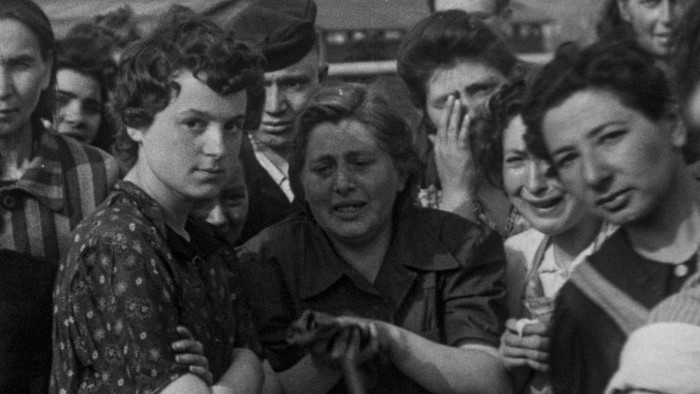Unlock the Editor’s Digest for free
Roula Khalaf, Editor of the FT, selects her favourite stories in this weekly newsletter.
On April 15 1945, the British army liberated the Bergen-Belsen Nazi concentration camp in northern Germany. Accompanying the troops that day were sergeants Mike Lewis and Bill Lawrie, two soldiers-cum-cameramen from the Film and Photographic Unit. Together they captured what they discovered: tens of thousands of starving, diseased inmates; countless unburied corpses piled high; the infrastructure which the Nazis used to orchestrate their genocidal operations.
Since the 1950s the footage has been kept in the archives of London’s Imperial War Museum. Now, on the 80th anniversary of the liberation, it will be broadcast on the BBC thanks to the Oscar-winning director Sam Mendes, who has created a short yet soul-tearing documentary from the scenes shot by Lewis and Lawrie and audio testimonies recorded decades later. Titled What They Found, the 40-minute film is both an unflinching confrontation with the horrors of Bergen-Belsen — where more than 52,000 people died, most of them Jewish — and a powerful meditation on the duty of bearing witness to atrocities then and now.
The footage, though monochrome and silent, is harrowingly immersive. Shots of a sprawling, almost alien landscape marked by mounds of bodies reveal the scale of the tragedy; close-ups of dead faces, frozen in anguish, give a wrenching sense of the individual suffering that can be lost in the incomputable Holocaust statistics. No less haunting are the images of the living. Emaciated and brutalised, they reach out to the soldiers, desperate to be acknowledged as human again.
While the footage speaks for itself, the commentary provided by Lewis and Lawrie (via excerpts from interviews conducted by the IWM in the 1980s) provides a rare insight into what it felt like to see the unimaginable first-hand. They describe the moments in which they began to grasp what the Nazis had been doing, and what the Allies had failed to stop. They talk about feeling helpless to do anything but record the despair, and hopeless in the presence of evil. While Lewis remembers the “arrogance” of the German officers on site, his abiding thought was that “anybody” would be capable of such monstrosity.
It’s a sentiment that’s echoed by the historian Simon Schama in his potent, deeply personal documentary The Road to Auschwitz, which airs on BBC2 immediately before Mendes’s film. Responsibility for the Holocaust, he argues, belongs not just to the Germans but to “everyone . . . from one end of Europe to another” who was complicit in, or else indifferent towards, the decades of escalating prejudice against and persecution of Jewish people.
As the Holocaust recedes further from living memory, it’s hard to overstate the importance of such films. Not just as lessons in history but as urgent warnings about how easily ordinary people can abdicate their humanity, and how readily they will dehumanise their fellow man.
★★★★☆
‘What They Found’ airs on BBC2/iPlayer on April 7 at 10pm; ‘Simon Schama: The Road to Auschwitz’ airs on BBC2/iPlayer the same day at 9pm and April 22 on PBS in the US
Read the full article here

